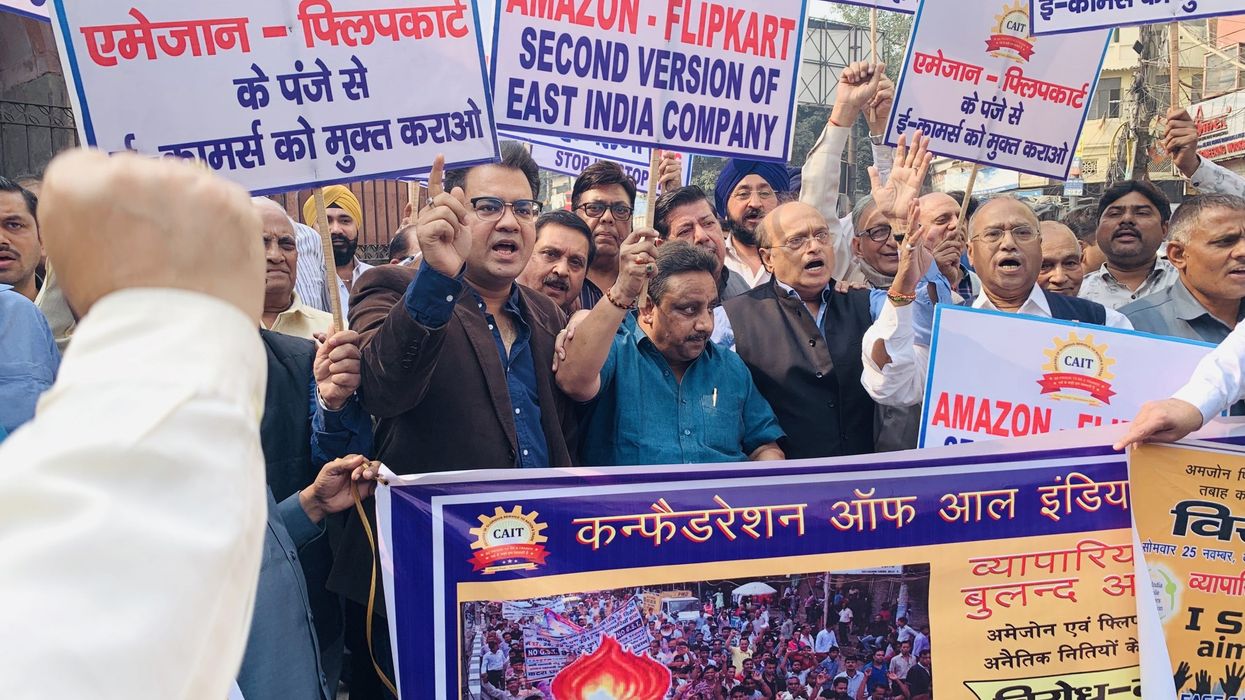THE Confederation of All India Traders (CAIT), which represents 40,000 trade organizations in the country, will launch an e-commerce portal for customers, its national secretary told Eastern Eye.
In an exclusive interview, Sumit Agarwal revealed around 100,000 traders in the country have already registered and 10,000 of them have created their e-shops on BharateMarket, where neighbourhood retail stores can serve customers digitally.
The CAIT was in the news recently when they won a case against e-commerce giants Amazon and Flipkart. Apart from fighting these giants in the courtrooms, the confederation also wants to promote its own platform.
“We want a clean and robust e-commerce (operation) in India and want it to thrive. Ideally, there should be a level-playing field for everyone. We are not afraid of competition,” Agarwal told Eastern Eye.

He added, “There are 80 million retailers in India. In order to help them we are launching this new consumer portal.
“The BharateMarket started three months ago. We are receiving a huge response from retailers across the country. Currently, around 100,000 have already registered with us. Through this initiative, they can have ‘Phygital’ shops (both physical and digital). We are planning to launch the consumer application in August.”
Initially, it will be available in Maharashtra, Odisha, Bihar, Uttar Pradesh, Chattisgarh, West Bengal and Madhya Pradesh, Agarwal said, adding that there will be no commission charged from retailers. They will get full value for the goods sold on the platform, which he claimed was first in in e-commerce.
Agarwal said big companies such as Amazon have the support of the US government.
“We also seek support from the Indian government. After all, we all are an important vote bank and a major contributor to India’s GDP as well,” he said.
In June, the Karnataka High Court allowed the Competition Commission of India (CCI) to restart its probe into allegations of anti-competitive behaviour against these firms.
Both Flipkart and Amazon have filed separate appeals before a division bench challenging the order.
Agarwal said: “On one hand they say they obey all the rules in the country. But they keep on appealing against court orders. Our question is simple - why do they fear an investigation. “The law says Amazon and Flipkart can operate as a marketplace in India. They can only invest in technology and can engage in B2B business, not B2C. Besides, they can’t have their own supplies and can’t control prices. They are flouting all these laws.”
According to Agarwal, if the verdict goes against them, the CAIT will approach the supreme court. However, he hopes that there will be a resolution to the issue in three months.
Agarwal said the Indian e-commerce market is currently worth $75 billion or $80bn. This is predicted to be $100bn in three years.
Mobile phones, which are the largest selling product in India when it comes to digital business, account for 50 per cent of e-commerce sales. And with home appliances and apparels, some 30 per cent of sales in India takes place digitally.
Recently, India issued draft e-commerce rules under the Consumer Protection Act and comments on the proposals can be submitted till July 21.
The CAIT supports the rules and said such measures are needed for creating a level-playing field.
The traders’ body, however, criticised major e-commerce players for opposing the draft rules.
Voicing his support for small retailers, Harish Bijoor, a Bengaluru-based brand consultant, said the reach of small retail cannot be replicated by big retail.
“Small is becoming progressively more and more beautiful. The pandemic has pushed this process further. Small kirana stores and local retailers have stood with the neighborhood during times of acute crisis. And now it is payback time,” he said.
“Small is relevant, small is original and small is innovative. Ubiquity and presence help market domination in retail. The small retailer is best suited to do this,” the founder of Harish Bijoor Consults Inc added.
“The triad of the mega, the big and the small will survive together in retail in India. E-commerce has its place, big retail has its own, and so does small retail. India is a nation of 14.6 million retail outlets. This diversity is here to stay.”




